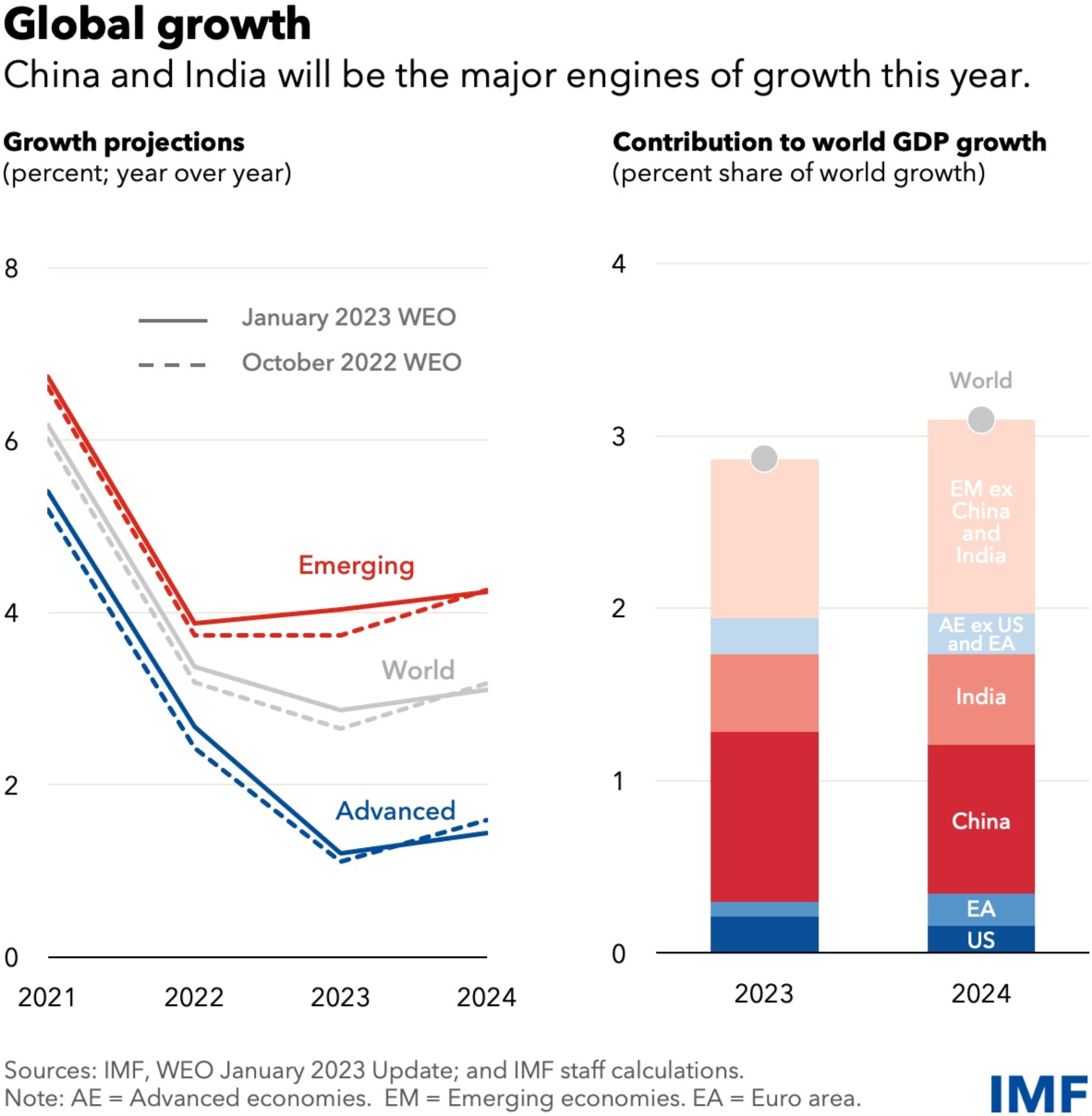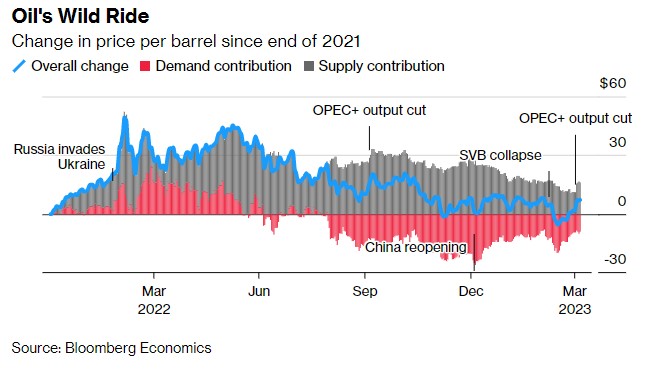The new recession-proof economies (and how to invest in them)
The prospect of global recession has been the topic de jour for over a year now but it’s not the universal concern you probably think it is. There are some countries that economists have largely assessed as having a minimal probability of entering a recession in the next year, and for a range of reasons.
Bloomberg recently published its recession probabilities based on economist consensus estimates in 2023.
- Unsurprisingly, the UK took out the charts at 75%. It’s had a hard year.
- The US isn’t looking much better at a 65% chance – and some would say it is already in a recession.
- There is less guarantee of Australia entering a recession with suggestions of a 40% probability. Regardless, we’re in a tougher climate.
On the other hand, countries like China, Indonesia, Saudi Arabia and India are sitting pretty. In fact, there are some suggestions India has no chance of a recession at all.
The IMF also points to China and India as major drivers of global growth in 2023 and 2024.

What makes these countries different?
Several factors unique to each of these economies offer them some protection from the broader global challenges, as I explore here.
India – a story of demographics and infrastructure growth
India has been on the economic rise for some time now. It is benefitting from a government focus on infrastructure spend, economic policy reform, a younger and larger working-age population and a growing middle-class (in turn pushing consumption).
On the last point, Global X ETF Head of Distribution Kanish Chugh notes that India’s per capita income is expected to rise from $1,178 in 2022 to $5,242 in 2031 which is highly supportive of overall economic growth and consumption spend.
“India’s resilience amid a weakening global macro environment is driven by the country’s focus on building strong foundations for structural growth. Over the last ten years, the Modi government has invested in rural and semi-urban infrastructure such as electrificiation, road and railway networks, and ensuring financial inclusion,” says Chugh.
The Centre for the New Economy and Society’s Chief Economists Outlook January 2023 suggested both India and Indonesia “may benefit from global trends such as a diversification of manufacturing supply chains away from China.”
It’s worth noting here that some of the world’s largest companies have heavily invested in India in recent times. Google (NASDAQ: GOOGL) purchased stakes in India’s second-largest mobile operator, Bharti Airtel, early last year while Amazon (NASDAQ: AMZN) has spent over $6.5 million in India over the last eight years. Apple (NASDAQ: AAPL) opened its first Indian storefronts in Mumbai and Delhi this month.
“India now accounts for roughly 7% of Apple’s global iPhone output, and annual sales in the country have skyrocketed over the past year to $6 billion,” Chugh says.
That’s not to say India is immune to global activity.
If its major exporters, US and China, fall into a recession, India will experience an economic slowdown. On the whole, the Indian economy is less intertwined with the globe and more domestically focused compared to others which should offer it resilience in challenging markets.
China – emerging from lockdown
A year after the rest of the globe, China has emerged from its zero-COVID lockdown and is ready to spend. Countless economists have theorised on how China’s reopening could in fact save the globe from a recession as its newly released populace travel again or domestically, the Chinese government pumps up infrastructure spend and therefore import natural resources like iron ore (a win for Australia).
Catherine Yeung, Investment Director for Fidelity International, notes that consumer confidence is still low in China and household savings in China are at 35% - so there is the money there when confidence returns. What will also be interesting about the return of consumption is how it ties into another trend – the growing middle class and ‘premiumisation’ in China, just as in India.
“What we are seeing is that the government has announced the creation of 12 million jobs. The employment component of the PMI was looking good, so a healthy labour market, this continued urbanisation theme, alleviating poverty, it leads to what we call premiumisation. So consumers at all pricing points, it doesn’t have to be luxury,” Yeung says.
When it comes to the risk of recession, it’s also worth considering that China is actually in a period of more accommodative monetary policy (aka they aren’t rising interest rates to manage inflation at the moment). In fact, the inflation print in March was the lowest in 18 months at 0.7% (source: Trading Economics).
“China essentially has gone through their recession and now are in a period of reflation,” says Yeung.
It is working to manage other issues, such as challenges in the property sector through supportive government spend.
Indonesia – resources rich and the rising middle-class
Much like India and China, Indonesia is experiencing significant growth in the size of its middle-class and in turn, associated consumption.
While these are supporting the Indonesian economy, the biggest factor comes down to its exports.
Indonesia is one of the world’s largest thermal coal exporters – and has only continued to benefit from global sanctions on Russia and the continued strength in commodities prices. Alongside coal, its top exports include palm oil, petroleum gas, ferroalloys and stainless steel. Indonesia’s biggest trade partners include China, the US, Japan, India and Singapore.
Indonesia’s palm oil exports will be supportive in 2023.
“As the largest producer of palm oil, Indonesia will remain a key supplier of cooking oils that are currently in short support given the war in Ukraine. Beyond this, contribution can be supported over the longer-term as both Indonesia and Malaysia have capped the plantation area growth to limit any further deforestation which will keep the market tight,” says John Stavliotis, Sector Head for Antipodes.
Stavliotis also expects Indonesia to benefit from the electric vehicle transition. It holds 22% of the world’s total reserves of nickel, a key component in batteries.
The oil baron – Saudi Arabia
In what will come as little surprise to anyone, Saudi Arabia is well-positioned to weather any global slowdown or recessions in other countries.
The sharp rise in oil prices and China’s reopening have been a boost for the oil-rich nation. Both Saudi Arabia and Russia are dominant members of OPEC+ and allied recently to cut crude oil output, which is likely to increase supply shortages and put prices on a higher path again. It’s also not good news for inflation elsewhere.

How to boost your investment exposure to resilient countries
Access to emerging middle-class and consumption themes in countries like India, China and Indonesia comes through a range of means, from commodities (to support infrastructure and energy needs) to equities sectors like healthcare, consumer discretionary and consumer staples (amongst others).
It is often difficult (or even impossible) for Australian investors to directly access equities listed on these exchanges so one path of exposure might be country-specific or region-specific managed funds and ETFs. Some examples include BetaShares Asia Technology Tigers ETF (ASX: ASIA), Global X India Nifty 50 ETF (ASX: NDIA), VanEck FTSE China A50 ETF (ASX: CETF), the Fidelity Asia Fund and the Platinum Asia Fund.
This is obviously far from an extensive list – you can search for more in Livewire’s Fund Finder tool here.
You can also consider companies that generate significant revenue from these countries.
Apple, Amazon and Alphabet were previously mentioned as investing heavily in India, but it’s also worth looking at ASX-listed companies too that derive significant revenue from these countries. Mining companies like BHP (ASX: BHP) and Rio Tinto (ASX: RIO) are obvious but companies like A2 Milk (ASX: A2M) and Blackmores (ASX: BKL) tap into the themes of premiumisation and desire for products that are seen as safe and healthy.
Don’t forget fixed income…
These countries have more stable (and lower) inflation numbers and in many cases, have already gone through their tightening cycles so their bond markets have been of interest to investors.
For example, Bloomberg data indicated that global managed funds purchased $3.5 billion in Indonesian debt markets in the first quarter of 2023.
While finding direct options is far from easy, looking at international funds which may have exposure to these markets can be a helpful starting point.
Some options include abrdn Emerging Markets Local Currency Debt Fund, VanEck Emerging Income Opportunities Active ETF (Managed Fund) (ASX: EBND), iShares J.P. Morgan USD Emerging Markets Bond (AUD Hedged) ETF (ASX: IHEB).
It’s worth noting that many international income funds adjust their regional and country allocations based on where they see the opportunities, so it helps to look through both Product Disclosure Documents and the latest fact sheets to see whether fund managers are incorporating these markets into their strategy. You can use Livewire's Fund tool to assist your search.
Do you have exposure to India, China, Indonesia or Saudi Arabia in your portfolio? Let us know more about your exposure in the comments.
3 topics
12 stocks mentioned
3 funds mentioned

